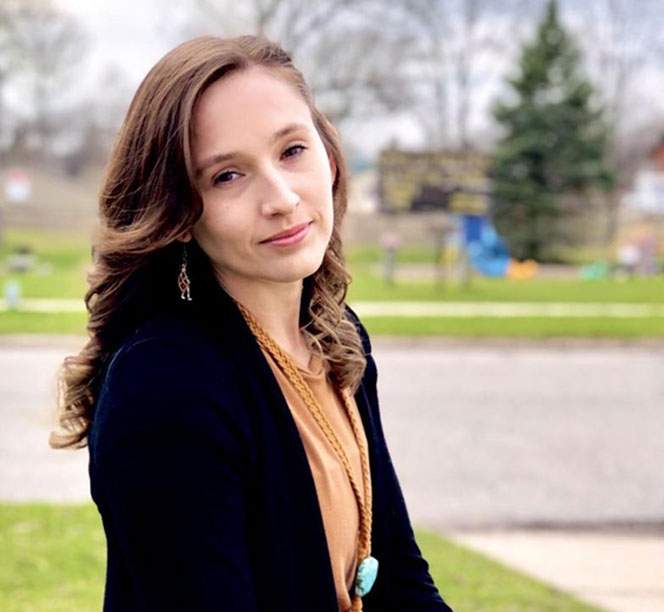Kylie Wilson

Kylie Wilson
In Search of Better Sports Nutrition Education
For some people, a master’s degree is the final stop, an opportunity to expand your expertise, get that promotion, find the next opportunity. For others, like Kylie Wilson, it’s part of the journey toward a final destination.
And she’s about to come full circle, as she’s become a master at integrating interests in education, exercise science, nutrition and performance.
Beginning the circle
From the small town of Bisbee, Arizona (pop. 5000), on the border with Mexico, Wilson left to go to Ellsworth Community College in Iowa on a softball scholarship. She then transferred to Western Illinois University, majoring in biology with a teacher certification. She taught high school science in Dubuque, Iowa, for a couple of years and then moved with her significant other to Cedar Falls when he was hired at University of Northern Iowa. After considering options, she decided to pursue a master’s degree in physical education with a kinesiology emphasis at UNI.
“I am a teacher by trade, so I highly value education. I knew for a while that I wanted to go on and teach a science-related discipline in higher education, so my master’s degree has provided me with teaching experiences in higher education, as well as my first taste of research that would be expected of me as a university professor. I needed to have these experiences to feel that I could be successful as a Ph.D. student,” she says.
At UNI, Wilson found a program and people to help her dreams of improving nutrition knowledge and guidance for all ages and types of athletes, whether Division I or recreational. Though she landed at UNI by circumstance, the welcome she received was surprising.
“It was almost until the last year of college when I connected with professors, but right away when I got to UNI, people wanted to know me. That was kind of strange at first, I was used to superficial introductions,” she says. “They really wanted to know my interests, saying ‘you should go to talk to this professor.’ They were just really accommodating and wanting to have this conversation. The extent that they were willing to go to support me wasn’t what I was expecting, but a welcome surprise.”
Gaining valuable experience
Wilson made the most of these connections. In her first year, she held part-time graduate assistantships for both research and teaching in addition to coursework. She collaborated with her mentoring professor, Scott McNamara, on studies in person-first language for use with disabilities, podcasting in kinesiology and characteristics of adapted physical education courses.
This collaboration exposed her to the research and publication process. She did a poster presentation at the annual Graduate Research Symposium in 2019 and planned to present at the 2020 national SHAPE (Society for Health and Physical Educators) conference, before it was cancelled due to COVID-19.
In her work as a teaching assistant, the 27-year-old helped evaluate and develop new directions for some of the courses in exercise physiology. “I really appreciated this opportunity because it allowed me to get a good feel about some of the responsibilities a university professor has. Also, Dr. Reed allowed me to guest lecture in his classes for extra experience,” she says.
Questions raised, a thesis forms
For her thesis, Wilson turned to a topic of great interest to her as a former female student-athlete.
“I have always been active, but I have not always known how to fuel properly. As I got older, I realized that my eating habits needed to change if I wanted to continue to healthily support my active lifestyle metabolically. This rang especially true as I started my master’s coursework. I started to wonder how many other athletes were not fueling properly,” she says. “I want to educate athletes on pairing fuel with performance.”
Wilson questioned how well athletes understand how their bodies work. “The problem is athletes don’t eat appropriately to fuel their metabolism,” she says. “I talked to Dr. Reed about that. He noted he’s often asked to do one-off lectures on nutrition, but is that effective? Is that enough?”
Wilson decided to investigate whether better nutritional education and resulting behaviors could positively impact sport performance. In reading the literature, Wilson discovered her interest converged with the growing field of sport nutrition education. “It’s a field that I feel is really starting to get the attention it deserves. We’re really not educating our athletes like we should, and we’re leaving them to find information on their own, which is not always accurate,” she says.
To research her contention, she created a nine-week sport nutrition education intervention to improve nutrition knowledge, self-efficacy, dietary habits, body composition and performance in Division 1 softball players and to measure its impact on retention of information.
Her findings? “We found out that we can increase their knowledge and self-efficacy, but we did not see any changes in behavior or dietary habits, body composition or in their performance,” she says. That sets up the next challenge for further study of sport nutrition education as she moves on to the Ph.D. program in nutrition and exercise science at Arizona State University.
Good-bye Iowa, hello Arizona
Wilson leaves the Midwest and UNI with good memories. “UNI helped me achieve my goals through their exceptional faculty and staff. Between Ellsworth, Western, and now UNI, I have never felt so supported than I did in my master’s program,” she says. “The faculty and staff, specifically in the Department of Kinesiology, get to know you as a person and truly want you to be successful. They are all brilliant, humorous, and kind people.”
Her next step gets her closer to home and family in Arizona--though UNI ties remain as she and her partner commit to a long-distance relationship for now. “I cannot wait to learn new things that will help me in my research and get me closer to my career goal,” she says, “but returning to the desert is a close second!”
